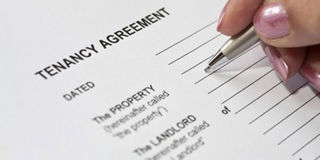Things to question in a tenancy agreement

What you need to know:
Most landlords have tenancy agreements which must be signed by every one who wants to occupy their houses. However, it is importnant that you read that agreement carefully before signing it
I had been renting a house for a year but in October, my landlord appeared at my door with a two-paged tenancy agreement. He told me that after reading through the 12 rules and regulations, I sign and return it to him.
When I read through, I was okay with all the other rules, except with one that read; “I, without anyone forcing me and the landlord have peacefully agreed and he is free to take my property from the house without consulting me in case I have broken the tenancy agreement between,” that left me puzzled.
Protection balance
Stuart Oramire, a lawyer advises that whether you are a new or old tenant, when presented with an tenancy agreement that has rules and regulations like the above, you should be able to stand your ground and argue it out with your landlord that any tenancy agreement is made to protect both the landlord and the tenant, but not one party. When resources permit, he says you should take an extra step and consult a lawyer before putting pen to paper.
When to be evicted
In case of any failures to pay rent, which Oramire reasons in most cases happens due to unforeseen financial challenges on the side of the tenant, you might find yourself in a situation where you spend some months beyond those signed in the agreement without paying rent.
“But even then, your landlord cannot evict you from the house simply because you have failed to pay rent. The law stipulates that he needs to have first issued you with at least a one or two months eviction notice if there is genuine justification that you have broken the tenancy rules or when he intends to use the house for other purposes,” Oramire explains.
Paying for damaged property
In some tenancy agreements, some landlords include a clause that says a tenant should pay or compensate for whichever property they found in the house that gets damaged during their stay in the house.
To avoid falling victim of such clauses in the agreement, Patson Arinaitwe, a lawyer says before occupying a house, it is advisable to inspect it and inform the landlord about the things that are not in order.
“When you understand what state you found the house, it helps you understand what you will replace or compensate for when leaving the house to avoid the landlord taking advantage of you by paying for what you did not damage,” Arinaitwe notes.
When to pay
Oramire adds that; “If you are to pay for any damages in the house, you should only pay where there has been reasonable damage caused by the tenant because there are several damages that occur naturally.”
Some of these natural damages include paint peeling off the walls, leaking water systems, cracked ceilings, among others.
Increasing rent unnecessarily
Due to unforeseen developments such as the introduction of tarmacked roads and power lines that are introduced in different places that were previously remote or less developed, they may at times set or drive location standards and compel landlords to increase rent without giving notices to tenants.
In some scenarios, the increase in rent may be a result of renovations on the house.
“If your landlord, for unknown reasons increases rent without honouring the agreement, you can challenge him in courts of law. If you are paying rent of Shs500,000 a month, the agreement should clearly specify or indicate the time frame you are to pay this amount,” Oramire advises, adding that agreements usually expire in years and in rare cases, months.




